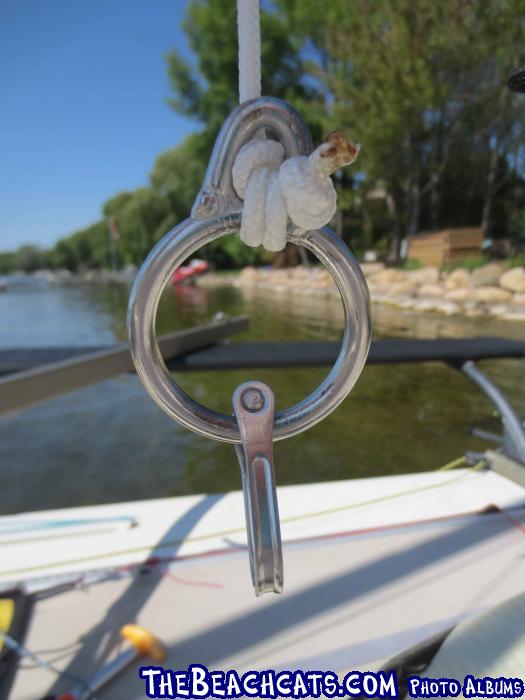I picked up an '84 H18 Magnum a year ago, & sailed the crap out of it this year. It came with the same flapper system your photo shows.
I never tried using the flapper, removed it on the advice of others here.
The rivet is SS, & quite hefty. Centre punch a mark, in the centre, so your bit doesn't wander, or do as I did, use an angle grinder to cut the rivet head off, then a 1/8" punch.
Also, if your boat has that little "feeder" thing screwed to the mast, just where you start the sail in the groove, remove it, it serves no useful purpose. Lay the sail just left of the boom & maually pull the bolt rope into alignment as you hoist. Don't forget to seal the two screw holes, or your mast will fill if you turtle.
Notice the hook is riveted to the port side of the mast,(looking towards the bows). For that reason I find when lowering the sail it is works better to rotate the mast clockwise. ei push the rotator bar towards the port hull. I simply give the halyard a strong pull, to raise the sail an inch or so, rotate the mast, & it comes down 98% of the time, especially if pointed directly into the wind. I hoit the sail on a Seadoo lift, & don't have the luxury of being directly into the wind, maybe 10% of the time, more usual is 45* off.
I had a 20' Mystere that gave me problems, (used the same sort of "hook" system), & I read every article, & Forum post, both here & Hobie Forum, with only limited success. The Mystere ring was this one, & it seemed the knot did matter.

When I changed the halyard from 1/4" down to 3/16" it was night & day, hooked/released every time.
When i got the H18, I tried every one of the various methods posted, including the Hobie article showing the difference knot forward/rearward.
The worst thing I ever did was try the advice to twist the ring a few times. That resulted in a sail I ended up leaving up overnight.
I now just use an anchor hitch on the basic Hobie round ring, & without any twists in halyard simply hoist the sail. You will feel it hit the top. Let it down a few inches, then give a solid pull. It will go up over the hook, & you will hear a "ting" as the ring goes over the hook & engages. On my H18 it's that simple, the only hassle is when the wind is blowing the sail against the shrouds, then it takes a couple of tries, or I wait for a shift & when the sail comes across, yank it up. This works 99% of the time, the final yank can be substantial, use gloves, of one of those line grippers.
--
Hobie 18 Magnum
Dart 15
Mystere 6.0XL Sold Was a handful solo
Nacra 5.7
Nacra 5.0
Bombardier Invitation (Now officially DEAD)
Various other Dock cluttering WaterCrap
--




